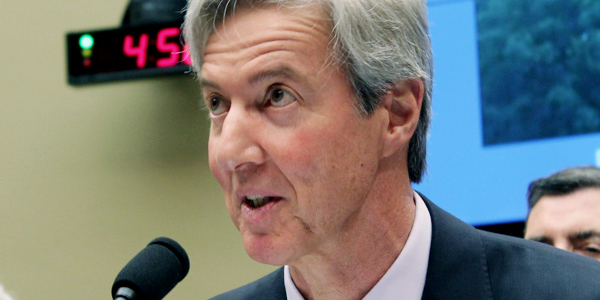By Christen Smith
Four top utility executives urged PJM’s Board of Managers to act on price formation at its Feb. 12 meeting after stakeholders deadlocked on the issue last week.
CEOs Chris Crane of Exelon, Ralph Izzo of Public Service Enterprise Group and Charles E. Jones of FirstEnergy signed a Jan. 29 letter criticizing PJM for failing to implement energy and capacity market rule changes despite a decade of stakeholder discussions. Douglas Esamann, president of Duke Energy’s Midwest and Florida regions, also signed the letter, which said PJM was lagging behind other eastern RTOs and ISOs in addressing its “woefully out of date” operating reserve demand curve.
“Specifically, PJM has not been able to adequately navigate the current stakeholder process that was initiated to address key energy market price formation issues,” they said. “As a result, critical reforms have been mired in regulatory proceedings for years.”
Crane and Izzo have long supported changes to PJM’s market price formation methodology, calling it a “no brainer” and “long overdue.” (See CEOs See Dollar Signs in ZECs, PJM Price Formation.) They and Jones have threatened to shutter their struggling nuclear plants without rule changes to increase the plants’ revenues. FirstEnergy also has sought subsidies for its coal-fired generation.
“It is imperative that the board and PJM act swiftly and decisively on important price formation reforms so that these fundamental issues can be addressed within the PJM markets,” the executives concluded. “The markets are at a critical juncture and clear leadership is necessary to ensure the markets evolve to work as efficiently as intended and meet the needs of customers and investors.”
‘Not Enough’
Aside from the RTO’s stalled price formation initiative, the executives also chastised PJM for not defining resilience attributes and reacting too slowly to fuel security concerns following the December 2018 NERC report highlighting potential risks from accelerated retirements. (See NERC Releases ‘Stress Test’ Analysis of Gen Retirements.)
“Instead of driving changes for appropriate market price signals, PJM remains a facilitator to implement changes that achieve stakeholder consensus,” they said. “This is simply not enough.”
“This letter is one of a number of communications we expect to receive on the subject of reserve price formation and the stakeholder process in advance on the next PJM Board of Managers meeting,” PJM spokeswoman Susan Buehler said. “The board will take all stakeholder comments into consideration before reaching any decisions.”
Jeff Dennis, managing director and general counsel of Advanced Energy Economy, criticized the companies’ reliance on the NERC report and PJM’s own fuel security study as the basis for pushing through regulatory changes without stakeholder consensus.
“Let’s be clear — they’re trying to shortcut the stakeholder process on those issues based on two reports that make no showing of likely reliability risks in the near or immediate term, finding long-term risks in only the most extreme scenarios,” he tweeted Thursday. “If we’re going to continue the search for the black swan, let’s at least do it in an open, technology-neutral way that actually addresses demonstrated grid needs, rather than forcing discriminatory tech-specific market rules that benefit fuel-dependent resources.”
Stakeholder Deadlock
The executives’ letter came less than a week after the Markets and Reliability Committee failed to approve any of five price formation proposals — from PJM, Calpine, the Independent Market Monitor, the D.C. Office of the People’s Counsel and Vistra Energy.
At the Jan. 24 meeting, load interests balked at the Jan. 31 deadline set by the board for stakeholder action. Exelon’s Jason Barker expressed frustration over the load interests’ request for more time after more than a year of discussions, saying “the time is now to move forward.” (See PJM Stakeholders Deadlock on Energy Price Formation.)
More than 60% of transmission owners voted in favor PJM’s plan or Calpine’s compromise package. The Vistra plan likewise received 86% support from TOs. Electric distributors and end-use customers unanimously supported the Monitor proposal instead. None came close to the two-thirds sector-weighted vote needed for approval.
PJM CEO Andy Ott said last week the board will consider input from both the MRC and upcoming Liaison Committee meetings before submitting a FERC filing on the issue. The Members Committee agreed to hold a special conference call no later than Feb. 8 if additional discussions yield a potential compromise in the interim.






